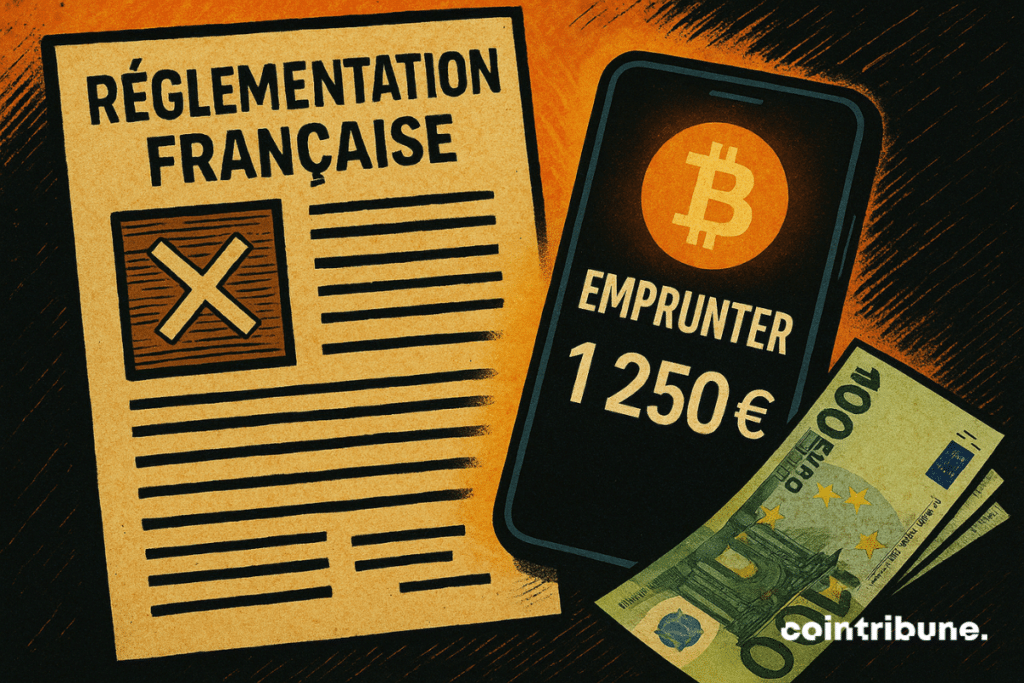Borrow Without Selling Your Cryptos: What the New French Regulation Changes
A law passed unnoticed allows borrowers to mobilize their digital assets as collateral. A discreet but symbolic turning point for the integration of cryptos into traditional finance.

In brief
- Cryptos can now serve as collateral for a loan in France.
- Only a few authorized banks offer this crypto Lombard credit.
- A legal framework exists, but access remains limited and highly regulated.
Since April 30, 2025, a discreet but fundamental regulatory change authorizes in France the use of crypto-assets as collateral within the framework of a Lombard credit. Previously reserved for securities, this financing mechanism now allows individuals or businesses to take out a loan in euros without selling their cryptos, provided they are deposited with an authorized CASP (Crypto Asset Service Provider) bank.
In practice, this allows an investor to mobilize their digital fortune to finance, for example, a real estate purchase or a professional project, while remaining the owner of their assets.
A symbolic advance, but still under constraints
This change of course is part of a still cautious European framework: current regulations require banks to fully cover the risk associated with crypto-assets by immobilizing an equivalent amount in own funds. A measure that currently limits the scope of these loans.
For Ambroise Helaine, France director of the crypto exchange Bybit EU, “this is not yet a usage revolution, but it is a clear turning point symbolically. The fact that a legal framework now exists to use one’s cryptos as leverage in traditional finance is a major advance. It sends a strong message: digital assets are no longer seen only as speculative, but also as carriers of patrimonial value.”
The advantages for borrowers are therefore real, but access conditions remain strict and amounts limited.
A still very regulated implementation
Although the law now offers a legal framework, the practical implementation of Lombard credit backed by crypto-assets remains fraught with obstacles. Only a few authorized CASP banks are able to offer this type of product, and they proceed with caution.
The reason: the prudential treatment of crypto-assets. Classified as high-risk assets, they require banks to mobilize an equivalent amount of own funds, which strongly limits their operational profitability.
Paul Bureau, Digital Asset Product Offer Director at Delubac & Cie, explains:
Not all crypto-assets are equal when it comes to backing a Lombard loan. At Delubac & Cie, we retain only very liquid and well-capitalized assets, such as BTC or USDC. Compliance is central: we require full traceability of the origin of funds. Eligibility also depends on the borrower’s profile and the quality of the portfolio, which are subject to safety margins via LTV ratios adjusted to volatility.
Besides regulatory constraints, there is also the question of asset custody. These must be deposited on controlled platforms or in partnership with the bank, which requires secure and suitable custody solutions.
He adds: “Monitoring a crypto Lombard credit requires a technical infrastructure capable of valuing assets in real-time and triggering margin calls instantly in case of rapid decline. This 24/7 monitoring is complex and requires robust systems. Moreover, the regulatory framework requires a French bank to immobilize one euro of own funds for every euro lent; this mechanically limits deployment capacity. However, custody is not a barrier: we specialize in the secure custody of crypto-assets in France.”
What short-term adoption?
While crypto Lombard credit remains for the moment reserved for a niche clientele, the existence of a legal framework opens the way to new uses. This is especially the case in wealth management or project financing without divestment. Ultimately, this type of arrangement could become a tool for financial optimization for crypto-asset holders, particularly if European regulations evolve to relax the treatment of digital guarantees.
On the banking institutions’ side, the most agile or specialized could take advantage of this new possibility to attract a clientele on the frontier between traditional finance and Web3. An increasingly present investor profile on the French market.
Maximize your Cointribune experience with our "Read to Earn" program! For every article you read, earn points and access exclusive rewards. Sign up now and start earning benefits.
The Cointribune editorial team unites its voices to address topics related to cryptocurrencies, investment, the metaverse, and NFTs, while striving to answer your questions as best as possible.
The contents and products mentioned on this page are in no way approved by Cointribune and should not be interpreted as falling under its responsibility.
Cointribune strives to communicate all useful information to readers, but cannot guarantee its accuracy and completeness. We invite readers to do their research before taking any action related to the company and to take full responsibility for their decisions. This article should not be considered as investment advice, an offer, or an invitation to purchase any products or services.
Investment in digital financial assets carries risks.
Read more